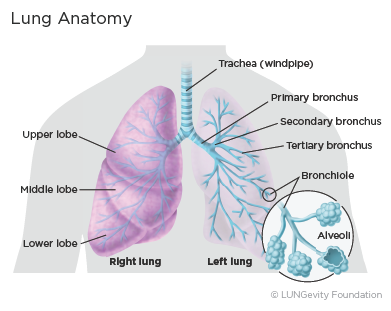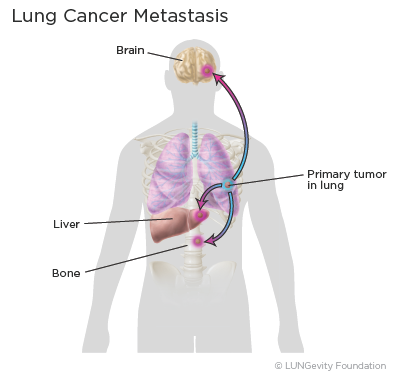To learn how lung cancer develops, it is helpful to understand first how the lungs work. Here you'll find the basics on lung function and how cancer can develop in the lung.
The primary purpose of our two lungs is to bring oxygen into the body and to push carbon dioxide, which forms as a waste product of the body’s cells, out. Each of our lungs has sections called lobesA portion of an organ—two in the left lung and three in the right lung. When we inhale, air enters our nose or mouth and goes down our tracheaThe airway that leads from the larynx (voice box) to the bronchi (large airways that lead to the lungs); also called windpipe. The trachea branches into two sets of bronchial tubes, each one taking air to a lung. Inside the lung, the air makes its way into smaller and smaller branched tubes, called bronchiolesTiny branches of air tubes in the lungs that narrow down from the bronchus and connect to the alveoli (air sacs), until it finally enters the alveoliTiny air sacs where the lungs and the bloodstream exchange carbon dioxide and oxygen, very small balloon-like sacs. The transfer of oxygen into the bloodsteam and carbon dioxide out of the bloodstream (and ultimately out of the airways) takes place in the alveoli.1,2

The lungs are made up of many different types of cells. Most of these cells are epithelial cellsCells that line the internal and external surfaces of the body. These line the airways and make mucus to lubricate and protect the lungs. Other lung cells include blood cells, nerve cells, hormone-producing cells, and structural cells.3
On the outside of each lung and lining the inside wall of the chest cavityA hollow area or hole is a thin membraneA very thin layer of tissue that covers a surface called the pleuraA thin layer of tissue that cover the lungs and lines the inside wall of the chest cavity. The pleurae form a sac called the pleural cavityThe space enclosed by the pleura, a thin layer of tissue that covers the lung and lines the inside wall of the chest cavity. Within the pleural cavity is a small amount of fluid that acts as a lubricant to allow the lungs to move freely in the chest when we breathe.1
Development of lung cancer
Normally, the cells in our lungs and other parts of our body have a specific growth and death cycle that keeps the number of cells in check. Cancer, of any kind, develops when a set of specific changes, called mutations, develop in a previously normal cell. When the set of mutations affects genes in ways that change the natural growth and death cycles of cells, unregulated cell division can result in too many cells. It's like a car when the gas pedal gets stuck or the brakes don’t work—the cells just keep dividing with nothing to stop them.
The mutated and abnormally multiplying cells form a mass called a tumorAn abnormal mass of tissue that results when cells divide more than they should or do not die when they should, neoplasmAn abnormal mass of tissue that results when cells divide more than they should or do not die when they should, or lesionAn area of abnormal tissue. In the case of lung cancer, this mass might be detected as a noduleA growth or lump that may be malignant (cancer) or benign on a chest X-rayA type of high-energy radiation that can go through the body and onto film, making pictures of areas inside the chest, which can be used to diagnose disease or CT scanA procedure that uses a computer linked to an X-ray machine to make a series of detailed pictures of areas inside the body. The mass can be benignnoncancerous, or it can be malignantcancerous.
When the tumor cells are able to invade normal tissues, the tumor is considered to be malignant. When the malignant cells originally come from the lung, the tumor is considered to be lung cancer.2
Spread of Cancer
The spread of cancer from one part of the body to another is known as metastasis, and the tumors formed by those cancer cells that have spread are called metastases. Lung cancer metastases can spread to lymph nodes around the lungs, and they can also travel through the bloodstream to other organs, such as bones, the adrenal glands, and the brain.2
Sometimes cancer starts in other parts of the body and spreads to the lung. That is considered metastasis of the original type of cancer, not lung cancer. Only cancer that starts in the lung is considered lung cancer.2
Updated February 12, 2024
References
- Non-Small Cell Lung Cancer Treatment (PDQ®)—Patient Version. National Cancer Institute website. www.cancer.gov/types/lung/patient/non-small-cell-lung-treatment-pdq#link/_118. Updated October 11, 2023. Accessed February 5, 2024.
- NCCN Guidelines for Patients®: Lung Cancer—Early and Locally Advanced—Non-Small Cell Lung Cancer. The National Comprehensive Cancer Network website. www.nccn.org/patients/guidelines/content/PDF/lung-early-stage-patient.pdf. Based on Version 3.2023 – October 11, 2023. Accessed February 5, 2024.
- Lung Cancer – Non-Small Cell: Introduction. Cancer.Net website. http://www.cancer.net/cancer-types/lung-cancer-non-small-cell/introduction. Approved December 2022. Accessed February 5, 2024.

